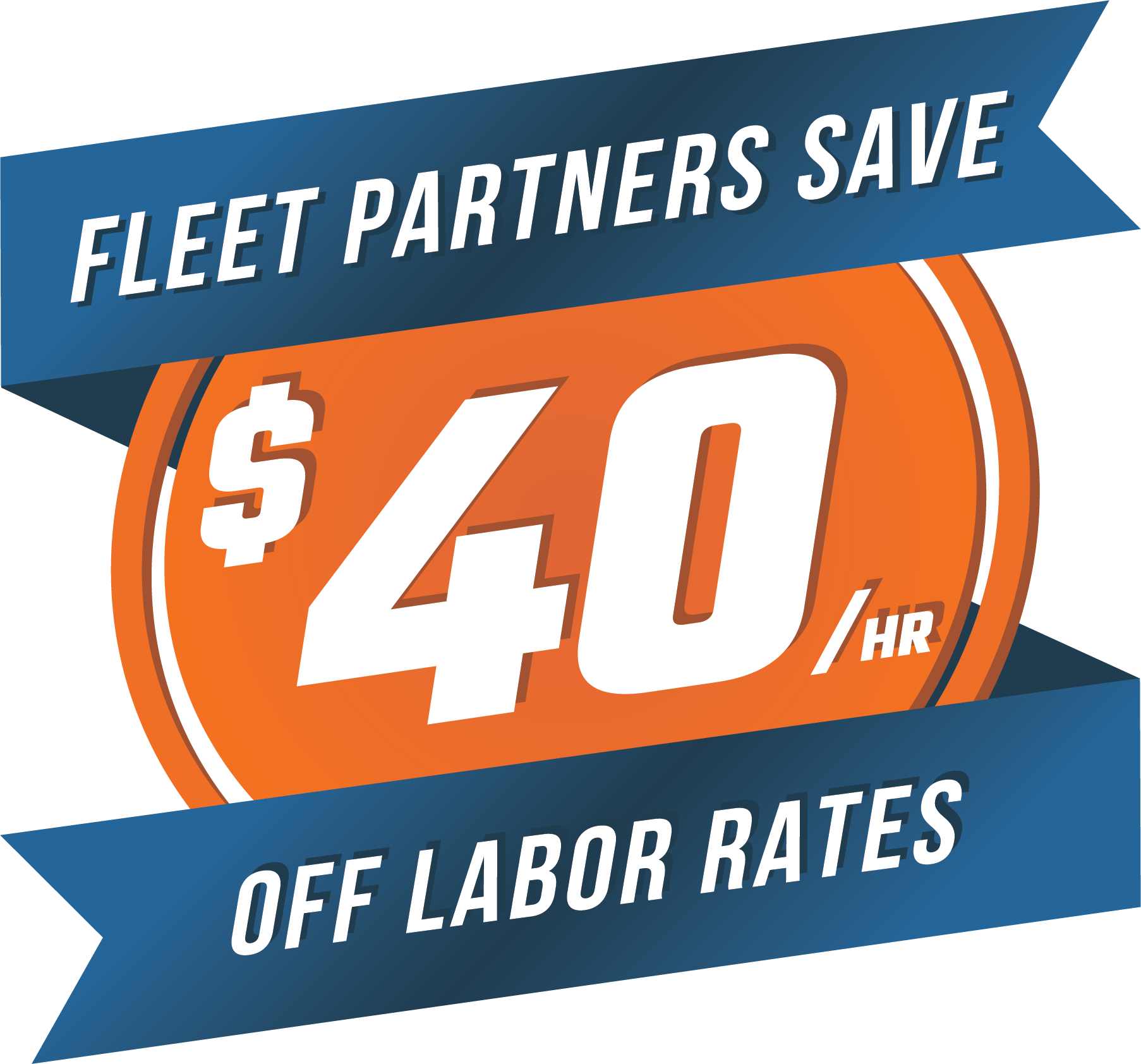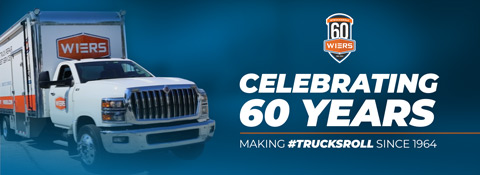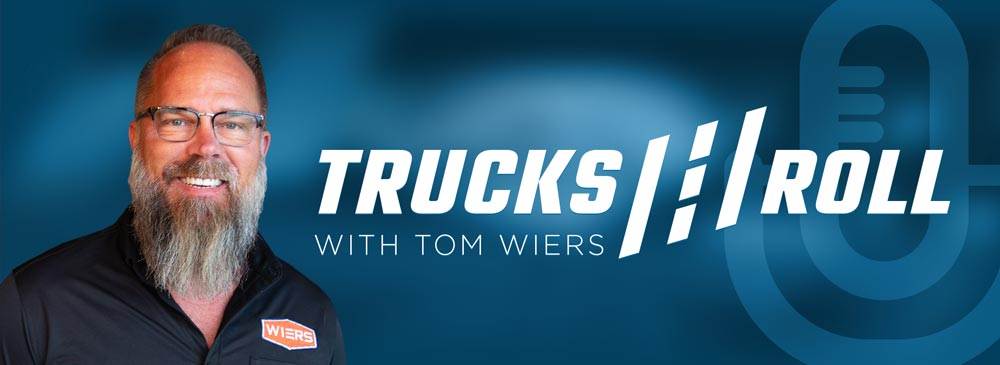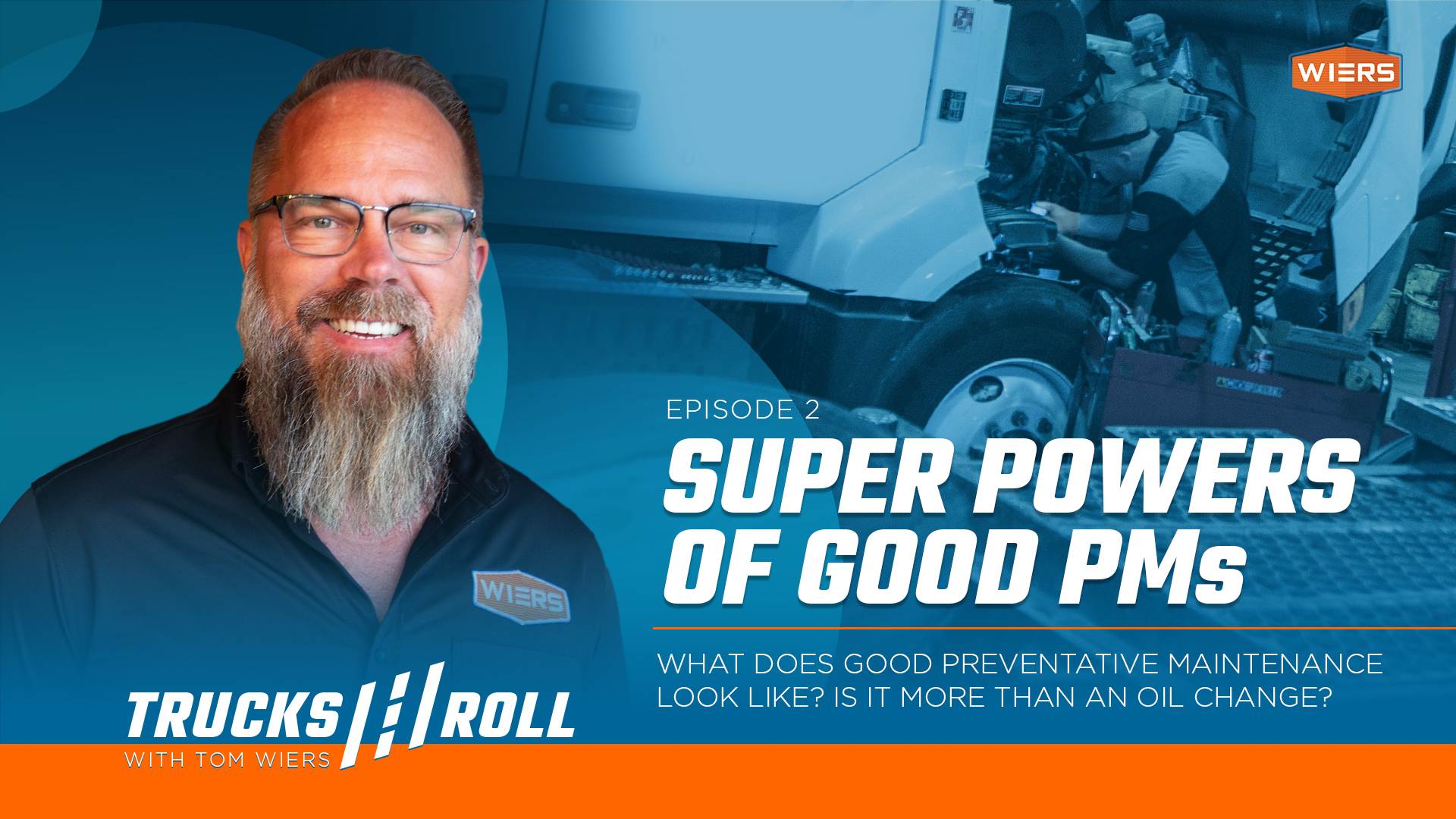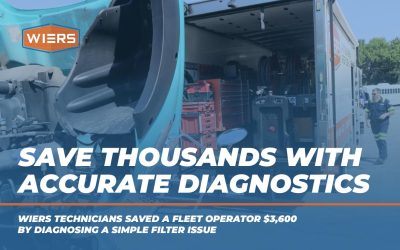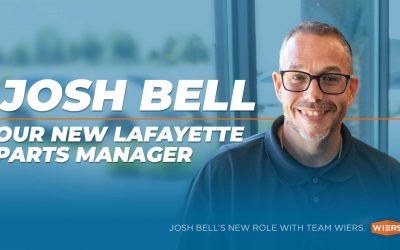
Super Powers of Preventative Maintenance – Trucks Roll Podcast Ep. 2
Taking Advantage of Preventative Maintenance to Keep on the Road
Tom and Liz are back to discuss the value of preventative maintenance on commercial trucks! They discuss the need for preventative maintenance in the highly-regulated industry of commercial trucking, what’s included in preventative maintenance, and more. After this episode, you’ll understand how important maintenance is for your vehicle, and how easy it is to get the experts at Wiers to take a look at your vehicle!
We at Wiers are experts in this field and can help you keep your vehicles on the road and earning. Visit us at wiers.com today to learn more about our services and how to schedule preventative maintenance today!
What You’ll Learn:
- Preventative maintenance helps you find problems early and get them fixed quickly.
- Scheduled repairs are far more cost-effective than unscheduled.
- Our experts can help keep you on the road!
Here is the transcript for Trucks Roll Ep. 2:
Tom: Oftentimes, the more familiar you are with commercial trucks and maybe the more in the maintenance side of that field, you’re going to know more about preventive maintenance. But as I said in our first podcast, many of our customers are running businesses and they don’t have maybe a great in depth knowledge of commercial trucks. So they have this car experience where I take my SUV in every, whatever, 3,000, 5,000, whatever the case may be, and I get an oil change done. If you bring that mentality to the commercial truck business, it’s going to turn out probably not very good for you.
Today on Trucks Roll, as we said, we’re going to talk about the super power of preventative maintenance with commercial trucks.
Liz: Yeah. I think what I’ve learned in my 10 months of being a part of Wiers is that what I’m used to as a general consumer is I go and get my oil change when that little sticker and the top left side of my car tells me to, and that is not how things work here at Wiers and how preventative maintenance works. So I will let Tom share a little bit more about what a good PM program looks like. If you don’t mind, Tom.
Tom: Yeah, no, that’s a great point, Liz, and I think that oftentimes, the more familiar you are with commercial trucks and maybe the more in the maintenance side of that field, you’re going to know more about preventive maintenance. But as I said in our first podcast, many of our customers are running businesses and they don’t have maybe a great in depth knowledge of commercial trucks. So they have this car experience where I take my SUV in every, whatever, 3,000, 5,000, whatever the case may be, and I get an oil change done. If you bring that mentality to the commercial truck business, it’s going to turn out probably not very good for you. And there’s a number of reasons.
Most of the states these days don’t even have any sort of inspection for cars, and you don’t have DOT related to your car and those sorts of things. And obviously, in the commercial truck business, it’s just highly regulated and safety and compliance are critical measurements, and they impact your insurance scores, they impact your DOTCSA scores and all kinds of things. So just simply changing the oil or doing what we refer to in the industry as a quick lube, isn’t enough to run a good, healthy commercial fleet.
So, what is included in preventive maintenance? Well, it does certainly include changing the oil, changing filters and greasing the chassis. Those are givens, but there’s a lot more in terms of inspections and adjustments and things that go into good preventative maintenance. So for example, when we have a truck in and we’re doing what we call a PM, we’re actually checking the clutch travel, and if the clutch needs adjusted, the technicians going to go down there and make that adjustment. Why does that matter? Well, that’s going to prolong the life of the clutch. It’s going to reduce the probability of having a failure when the truck’s out on the road or in your customer’s lot, and it’s going to save you money over the long haul.
The great thing about preventive maintenance is you can identify those issues with the chassis, with the truck while it’s in, and then schedule it on your time and on your schedule to get it fixed. And again, if you catch it early, you’re using cheaper parts, cheaper labor, and those sorts of things. When people try to skimp, and they may not even knowingly, but they want just want to go for an for oil change, they look at price as the determining factor. You don’t get those adjustments done, you’re going to have faster wear times, and oftentimes trucks are going to break not when it’s convenient for you. In fact, a lot of times when it’s most inconvenient, right?
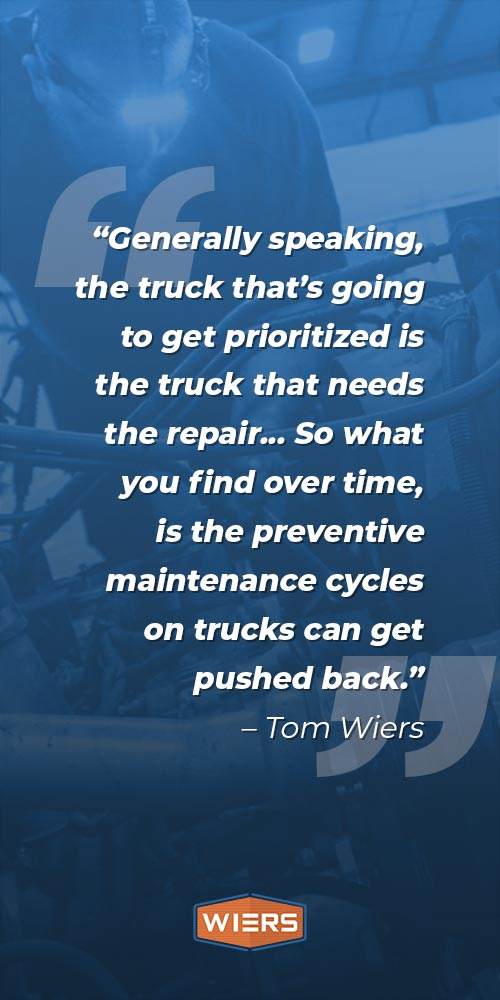
Tom: During rush hour on a highway, or when your customer load is critically important, and those sorts of things.
Liz: Right. So I did want to share a quick little story, and of course my first couple months here, I got the opportunity to go on site to one of our customer’s lots and did a PM with the mobile tech and really learned a lot about that experience. And really, it’s so much more than just an oil change. So thank you for sharing all of those points.
Tom: I was going to say that sometimes, good driver involvement can help identify things early and they can communicate those to the shops, but also part of the inspection, when that technician’s under the chassis and rolling around and looking at brake lines and seeing them to ensure they’re not chafing and rubbing against the frame rail, or whatever the case may be, those are great opportunities to, again, find problems early and get them fixed quickly.
Liz: Right, because I think the other point that you’ve shared is that preventative is way more cost effective than, what’s the other one? I’ve totally gone blank. Proactive versus…
Tom: We could say reactive.
Liz: Right.
Tom: Or scheduled versus unscheduled.
Liz: Yeah. Yeah.
Tom: Yeah.
Liz: Well, that’s so, okay, one thing I’ve also learned is our customers can really have two opportunities to take care of their trucks. One is they can have their own maintenance team take care of their trucks, or they can outsource to a group like us. What’s the benefit really of outsourcing?
Tom: Well, and you make a great point, Liz. A lot of our customers have their own maintenance facilities, repair shops, they have their own technicians. Sometimes it’s just one person in the corner of the warehouse that works on their trucks, and sometimes if it’s a large fleet, they may have 10 or 20 technicians in a facility. So we work with all types of different customers, and sometimes it doesn’t make sense to outsource. If you’ve got the capabilities, you’ve got the skillset, you’ve got the capacity, then doing it in house, it’s a perfectly fine solution. Although, I will say you need to have a certain number of trucks to make it cost effective, but that’s maybe a different topic for a different time.
But one thing I will share is that in this day and age, when technician shortage is so acute, we have challenges having enough technicians, our customers are having those similar challenges. So if you think about a shop that let’s say, ideally they’d have five technicians, but because they can’t hire enough, they’ve got three, right? So now you’re down, you’re 60% of capacity, and there’s two trucks and one needs a repair so it can go take tomorrow’s delivery out, and the other one needs preventative maintenance.
Well, generally speaking, the truck that’s going to get prioritized is the truck that needs the repair, because the other one can run and this one cannot. So what you find over time, especially in those shorthanded situation, is the preventive maintenance cycles on trucks can get pushed back. So that truck doesn’t get PM today, we’ll do it tomorrow. Then that doesn’t happen. And then a week goes by and then maybe a month goes by. Before long, you’ve got too many trucks out of compliance, they’re wearing faster than they should, and over a period of time, you end up with more breakdowns, higher costs, repair costs, and those sorts of things.
So it might make sense for some fleets, if they’re shorthanded, to outsource the preventative maintenance, make sure it’s getting done and handle the repairs in house, or we have some custom customers that do it the opposite, where they’ll outsource repairs and do the preventive maintenance in house. It’s just more of a preference, and we like to work with our customers to identify which is the better solution for them, if outsourcing is a good idea.
Liz: Thanks, Tom. So we talked through the super powers of PMs, and maybe what our listeners and customers if they’re thinking, I have no idea where to get started, where would you suggest they start?
Tom: Well, first off, it’s very common for customers to have those questions and thoughts. Again, they’re experts in their business, whatever that might be, and they’re not necessarily experts in the commercial truck business. So if you have those questions, that’s a great start. And when we’ve worked with customers in the past that don’t have a good robust program, there can be a tendency to want to tackle, eat the elephant if you will, in one bite. And that’s really not the way to do it.
We advocate a slower approach. Look at the fleet. I mean, how some trucks run high mileage, some might run low mileage. You might have different types or styles of trucks doing different jobs in your company that need different preventative maintenance cycles. So really, you have to peel back the onion, spend a little bit of time analyzing and create a starting point. When you do, we talk about the superpower of PMs, you can PM trucks schedules, you can have a schedule based on time, mileage, engine hours. If you try to do all three of those at the same time, then it gets overly complex and really hard to implement. So starting simple, starting slowly, and then really the key is just measuring success. Can we measure them over time, let’s say for a year, for example? Are we seeing a reduction in tow bills or breakdowns? Are we seeing less-
Liz: More deliveries.
Tom: What’s that?
Liz: Could you see more deliveries?
Tom: You could see more deliveries, higher customer satisfaction. All those sorts of things. I mean, you think about for our customers when they have a truck that breaks down, the amount of chaos that creates for them. That’s probably, unfortunately, sometimes too routine. They’ve got to reschedule the load. They’ve got to figure out what to do with the truck and the driver, and how they’re going to ship tomorrow’s schedule. All those costs flow through their business and create a lot of stress on their staff, and that can even relate to turnover. So, there’s a lot of, we talk about preventative maintenance, it’s not only the cost of the maintenance in your overall budget, but also the impacts throughout the rest of the organization, and efficiencies and satisfaction, and all those sorts of things.
It’s really great stuff. I think, at the end of the day, if you’re needing to review and evaluate your preventive maintenance program, and work with somebody like Wiers or somebody, or work with Wiers preferably, obviously, but just have a consult. We’ll do that free with customers and sit down and get a feeling. I think a real big part of this, of a good preventive maintenance program, is having a trusting relationship with your vendor. There’s a misconception that sometimes with customers that, hey, if I take it into there, they do the preventive maintenance, they’re going to give me this long list of things that need to be done. Well, that might be true. I mean, if trucks haven’t been well maintained, there’s what we call deferred maintenance, you’re absolutely right. You might have to catch up. In fact, we see that often.
But once you get caught up, if you’re willing and disciplined to stay on top of it, then we’ll see costs sometimes will go up in the short term, but then they’ll go down over longer period of time. But you have to have trust in the vendor. If they say something needs fixed, you have to trust their judgment and get it fixed and commit to the program, and that’s what it takes. Of course, if you’re skeptical of your vendor and what they’re telling you, well, then it’s hard to make those yes decisions, and so the cycle kind of perpetuates itself. So, find a good vendor, develop the program, and then run it for a period of time. Usually I say a year. Evaluate it, and then continue to make adjustments, is what I would do.
Liz: Sounds like a plan.
Tom: Yeah, absolutely. Well, I appreciate, Liz, you joining me for this second episode of Trucks Roll. It’s a lot of fun to take what we’ve learned and share it with people out in the commercial truck industry, whether you’re a driver or an owner or in the maintenance field, or whatever the case may be. We have a lot of admiration for those in the commercial truck space. They deliver all of our products and services, and it’s never been more important and no more apparent than during these crazy last couple of years. So thanks for joining Trucks Roll, and we’ll be coming at you with new episode soon. In the meantime, go to wiers.com and learn more. Thank you.
Liz: Thank you.
Listen To “Trucks Roll” Podcast
Links:
- Share your thoughts and connect with us on Facebook
- Check out more videos on Youtube
- Listen to the Previous Episode
